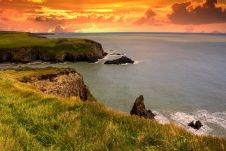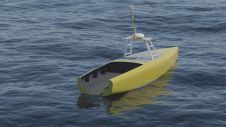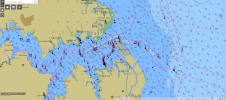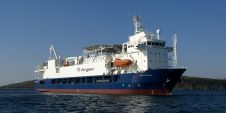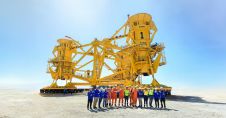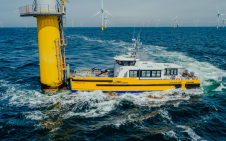Classroom@Sea
Bringing Real Marine Science into the Classroom
Classroom@Sea is a novel outreach initiative designed to bring cutting-edge marine science into classrooms across Europe. Based around real scientific expeditions on research ships, Classroom@Sea engages teachers and pupils in the journey from scientific hypothesis to investigation, discovery, analysis and interpretation.
With our oceans coming under increasing pressure from human activities, there has never been a more urgent need to understand the marine environment and how it works. This applies not only to scientists, stakeholders and policy makers, but also to the general public and, perhaps most importantly, to the marine scientists of the future – school children. Classroom@Sea engages teachers and pupils in the excitement of scientific research expeditions and the thrill of exploring the unknown.
Importance of Marine Science
In UK schools, in common with many other European countries, marine and earth sciences are taught only at a very basic level, if at all. Although improving, the few marine or earth science concepts that exist in the curriculum are often taught in a very ‘dry’ fashion with few visual or practical aids to bring the subject to life. With global change now being a high priority of European research, it is essential that school children and the general public are aware of the issues threatening our oceans today, and they are also engaged in the research so that they understand the processes by which scientists obtain their results. This is particularly important now, when so many important policy decisions are being taken that will affect their future enjoyment and use of our oceans. Understanding how our oceans work is fundamental to ensuring that future generations have the tools to manage, conserve and enjoy the oceans responsibly.
Research in Hostile Environment
As marine scientists, the most fundamental (and expensive!) activities we undertake are the expeditions to far-flung corners of the globe to probe the ocean’s secrets, using dedicated research vessels equipped with the latest state-of-the-art technology. For most members of the general public, the notion of boarding a ship and sailing off into the sunset to undertake a scientific mission in one of the most inaccessible and hostile environments on the planet – the deep sea – is the stuff of science fiction rather than science fact. Classroom@Sea invites the non-scientist to join the expedition and share in the experience, not only from a scientific perspective but also in terms of living life in the alien environment of a research vessel. It is these expeditions that provide the greatest opportunity to stimulate young minds and encourage young people to consider a career in marine science.
The Art of Communication
The Classroom@Sea initiative is led and managed by the National Oceanography Centre, Southampton (NOCS), in the UK. From its conception in 2003, the project’s aim has always been to enthuse and inspire schoolchildren by sharing the journey of scientific exploration and discovery. And what better way to do this than by recruiting school teachers to join the scientific team on board the ship. There are many scientists who are excellent at communicating their research to the wider public. However, teachers are ideally qualified and placed to not only share the excitement of being at sea on scientific expedition, but also how to communicate the ideas, concepts and theories in a format appropriate to our target audience: school pupils.
Novel Approaches to Teaching
In addition, a teacher’s understanding of the curriculum means that they are able to apply their experiences on board the ship to aspects of their teaching where they would otherwise perhaps rely on standard demonstrations or examples. Many of the basic scientific principles taught to 11-16 year olds can be demonstrated using the marine realm as an example; indeed, finding new and innovative ways to present concepts and theories provides an invigorating and rewarding experience for teachers and pupils alike. Life on a research ship is a unique experience and, we feel, best communicated to the outside world through the eyes of someone who is experiencing it for the first time.
Recruitment and Preparation
In the summer of 2004, two science teachers from two UK schools were recruited to take part in a 3-week cruise to the Portuguese margin (Atlantic Ocean) aboard RRS Charles Darwin.
In the run-up to the cruise, their pupils were involved in a number of workshops, competitions and activities based around the research we do at NOCS, including designing simple experiments for the teachers to carry out on board in order to test theories and concepts learnt in science classes. For their part, the teachers documented their preparations in the run-up to the cruise, including the indignity of hauling themselves into a life raft during the compulsory sea survival course! They also researched material to add to the ever-growing archive of background science information available on the website, and devised activity sheets for other teachers to download and use in their classes.
Life on the Ocean Wave
Once at sea, the teachers wrote daily accounts of their experience on board the ship, relating tales of the trials and tribulations, anticipation, success and occasional disappointment that are an integral part of a scientific expedition. Feature articles on the roles of crew members and scientific team, how the ship’s cook caters for the masses without a supermarket nearby, and video footage of a close encounter with a Minke Whale served to draw in even the most non-scientifically minded pupil in the audience. Those following the progress of the cruise on the website were able to communicate with the team on board via an interactive ‘Question and Answer’ session, where the team were tested by a range of questions varying from the predictable ‘How deep is the sea where you are’ to the more taxing ‘Do fish break wind’, which sparked a lengthy debate amongst the marine biologists on board!
A Symbiotic Relationship
As well as providing the obvious benefits to schools, the involvement of teachers on a cruise is also a positive experience for the scientists on board, often allowing them to view scientific problems from new and unexpected angles when faced with the need to explain their science at its most basic level. Unfortunately, funding is not always available to finance the participation of teachers in our expeditions, but wherever possible a small team of shipboard correspondents are recruited from amongst the scientific team. For the most part, these individuals tend to be PhD students or young researchers, many of whom are going to sea for the first time and are experiencing the ship environment in much the same way as a non-scientist would, enabling them to communicate the experience in a much more engaging fashion. With the ability of being able to communicate science to a public audience becoming an increasingly valuable and essential skill, the exercise greatly benefits the researchers as well as the audience.
Our Next Adventure
This summer, the UK’s newest research vessel, RRS James Cook will set sail for a 6-week expedition as part of the EC-funded HERMES (Hotspot Ecosystem Research on the Margins of European Seas) project. Equipped with the Remotely Operated Vehicle (ROV) Isis, the international team of marine geologists, biologists, geochemists, geophysicists, ecologists and oceanographers on board will carry out multidisciplinary surveys of cold seep environments in the Gulf of Cadiz, the submarine canyons offshore Portugal, and the submarine canyons offshore Ireland. Funding permitting, six teachers will join us for the experience – two teachers on each of the three legs of the cruise. Advances in communication technology mean that we hope to bring more video footage, live interviews and film from the ROV as it probes the depths of the European margin.
The adventure will start on 14 May 2007... join us at www.classroomatsea.net.

Value staying current with hydrography?
Stay on the map with our expertly curated newsletters.
We provide educational insights, industry updates, and inspiring stories from the world of hydrography to help you learn, grow, and navigate your field with confidence. Don't miss out - subscribe today and ensure you're always informed, educated, and inspired by the latest in hydrographic technology and research.
Choose your newsletter(s)

